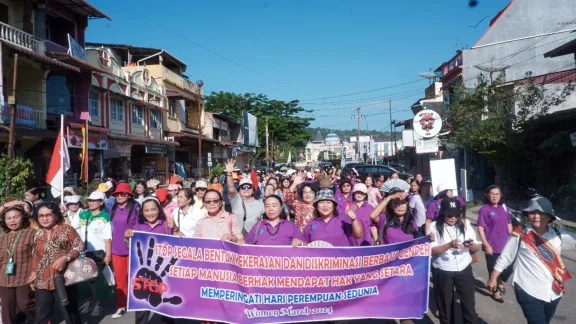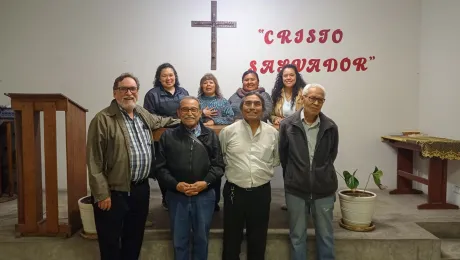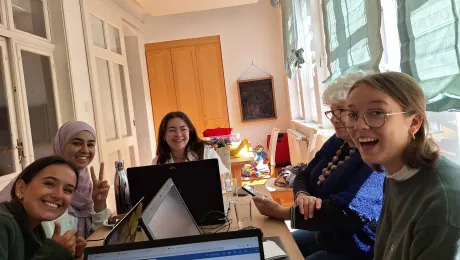Long-term projects
Last deadline for applications: 08 January 2025
Currently, there are no available opportunities for this campaign
Criteria for submitting project proposals
LWF-supported projects address strategic priorities of the member churches. We are calling for new projects that will start in 2026 and run for a maximum of three years. Any LWF member church, national committee, regional expression or related diaconal institution is eligible to apply.
Ongoing projects will not be automatically extended. Project holders aiming at continuing projects that will conclude in 2025 should apply for a second phase, which may last until 2028 at the latest.
Project applications need to demonstrate the continued relevance of the project, show in which way it will be sustainable and if possible, increase its own financial contribution. Please note that a project extension is only possible once and such extension is not automatic if no application is submitted.
To assist churches in the process, the LWF will offer workshops to explain the logic of project design, from identifying needs to writing an application. Interested churches should register by 6 October 2024, including the names and emails of up to three participants whose work evolves around project design, coordination, or finances.

Participants in the “Stop Women’s Violence March” in Nias, Indonesia. This is part of an LWF-supported project by the Protestant Christian Church (Banua Niha Keriso Protestan) on gender equality, justice, and the right for women to live free from violence in the country. Photo: BNKP
For enquiries, please contact the Member Church Project Desk
Workshops schedule
| Dates | Times | Languages |
|---|---|---|
| 16 Oct. 2024 | 9 A.M. Central European Time | English |
| 31 Oct. 2024 | 2 P.M. Central European Time | English, Español |
| 1 Nov. 2024 | 9 A.M. Central European Time | Français |
For further details, please refer to the information below.
Eligibility to apply and criteria for approval
- Eligibility of project holder ¶
- Eligibility of project proposal ¶
- Financial contribution and project duration ¶
- Screening and approval criteria ¶
- How to apply ¶
- Any LWF member church, national committee, regional expression or related diaconal institution is eligible to apply;
- Only one application per church (entity) may be submitted;
- All applications must be endorsed by the church (head office). In the letter, the requesting church must demonstrate convincingly how a given application responds to strategic priorities of the church;
- Priority is put on churches that don’t have an ongoing LWF-funded project.
Project proposal must:
- Be fully completed including budget and church endorsement;
- Show a clear link between the identified needs and the proposed activities;
- Demonstrate clearly the urgency of intervention in the case of rapid response projects;
- Show convincingly the relevance of the project’s objectives and activities in relation to the expressed needs;
- Give a realistic scope of the project’s objectives and activities in relation to the budget and the capacities of the applicant;
- Outline a coherent approach and reflect meaningful stakeholders’ involvement, in particular of youth and women.
Ongoing projects are not automatically extended and must apply for a new cycle based on the following criteria:
- Relevance: objectives build up on the achievements of the previous phase and/or activities are scaled up to new geographical areas and target groups;
- Sustainability: the new phase strengthens the achievements of the previous phase to ensure that the positive change will last after the project has ended;
- Increasing financial ownership: the budget must reflect a progressive reduction of LWF’s share and a consequent increase of the project’s own contribution and/or third-party contribution in order to set the basis for LWF funding withdrawal;
- Projects can only be extended once.
Long-term projects
- The LWF applies a policy of equitable sharing of financial resources. Most project grants are in the region of EUR 10,000 – EUR 25,000 annually. Exceptionally the LWF can grant up to a maximum of EUR 50,000 per year based on funding availability, project design, matching needs and proven implementation capacity.
- Project holders must contribute at least 5% of the total budget, with in-kind contributions accepted if financial support is not feasible.
The following criteria apply:
- Regional balance in allocation of grants is observed, depending on the most urgent needs and churches’ own available resources to respond;
- The application process will be competitive, taking into account the identified needs and how the proposal clearly demonstrates compliance with the above criteria;
- For fairness, member churches or related diaconal institutions should have only one long-term project at any given time.
Application must be submitted via our online portal:
- For English: https://webportalapp.com/sp/home/lwf_pcmprogram_en
- Para español: https://webportalapp.com/sp/home/lwf_pcmprogram_en#es
- Für Deutsch: https://webportalapp.com/sp/home/lwf_pcmprogram_en#de
- Pour le français: https://webportalapp.com/sp/home/lwf_pcmprogram_en#fr
Contact
Member Church Project Desk
Contact
Get Involved
Share with us your stories, photographs and insights using the #LWF


